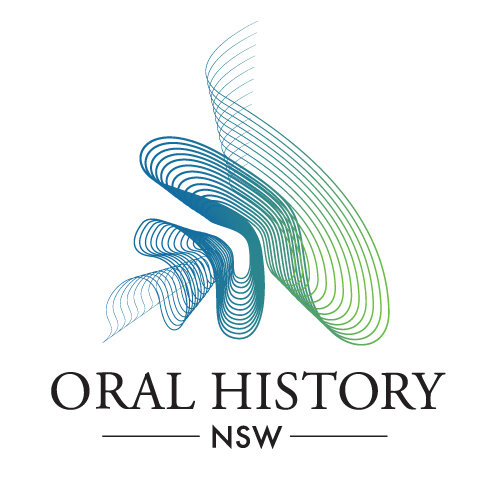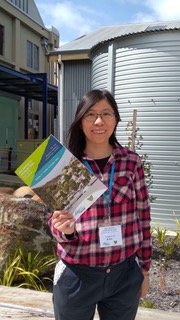Louise Whelan is a photographer and oral historian, and a recipient of the 2022 Oral History NSW Conference Grant awarded to two presenters attending the Biennial Oral History Australia Conference in person. Louise writes about her project, and presenting and attending the conference held in Launceston.
There was a certain irony of delivering a presentation on the experiences and challenges of recording the extreme and historically durational droughts in Australia at the oral history conference October 2022. Tension and uncertainty were felt, as rains fell in Launceston, rising waters levels encroached on land, and flood mitigation processes implemented at the river’s edge. This was more than a nod to the challenges related to our changing environment.
Drought conditions in Broken Hill NSW 2019. Photograph by Louise Whelan. Mitchell Library, State Library of New South Wales.
My talk was based on oral histories and photographs I produced about the NSW Drought, acquired by the State Library of NSW. The interviewees ranged from a 5th generation pastoralist, mental health nurses, cotton farmers, a wool classer, volunteers from the Country Women’s Association and many more. Also in the collection are interviews with Aboriginal elders about climate change, drought and the Murray Darling River system. This documentation was as much about water management as it was about the drought.
The combination of the two disciplines - oral history and social documentary photography during prolonged drought was to some extent traumatic. I was listening and looking with a narrow intention - the ear telling the eye where to look and vice versus. The listening gathered momentum during this real time drought disaster. I witnessed and recoded stories of death, loss of hope, financial hardship, generosity as well as migration of both people and wildlife.
Far from a stand-alone oral history project, I presented as an oral historian, photographer and artist. The work combined images, orality, and the arts as a way of processing environmental trauma.
Artwork created by Louise Whelan as a way of processing environmental trauma. Natural dye fabric with embroidery stitching.
My trepidation of an image-heavy presentation with artistic expression reflection turned to relief after the Keynote presentation by Mark Cave. Mark reflected on the historic New Orleans collection In the immediate aftermath of Hurricane Katrina by combining photographs and oral history edits, the images giving a deeper meaning to oral history, a sense of the visual scene during the disaster.
Mark presented on the idea that while the experiences of recording oral histories during disaster is central for cultural memory deposits for our nations, recording during or not long after a crisis presents challenges for both the interviewee and interviewer. I could completely relate to Mark’s ideas that healing of communities can happen when reflecting on the shared experience. As an oral historian, listening, not contextualising, experiences of recorded memory is key to oral history practise. During disaster the listening also becomes an act of generosity.
Mark’s presentation prompted reflective thoughts for me. Unlike fire, floods, or hurricanes, during a drought there were no sirens, no State Emergency Services or urgent responses. The First responders were the Country Women’s Association, mental heath nurses, and to some extent me, the oral historian, listening, bearing witness and validating the crisis by way of the interview and photographic documentation. My reaction to their stories and disclosure is important.
From inception to presentation this work came full circle.
Changes and challenges associated with environmental disasters have been preserved in pre-literate cultures long before the settled colonies and cultural institutions. My first dive into the research for this work was reading Peter Nunn’s The Edge of Memory. Peter looked at oral history stories and myths that have scientifically verifiable facts of historical climate events. He cites the story of the Narungga people (Australia), stories that have remained extant for at least 9330 years. Stories that continue to be told not just as myths but as ways of communicating knowledge for survival across generations.
Uncle Bruce Shillingworth. Muruwari and Budjiti man, artist and Water for the Rivers creator of Yaama Ngunna Baaka. The dry riverbed at Walgett NSW 2019. Photograph by Louise Whelan.
During my on-the-ground-research I met with Aboriginal Elder and water activist and advocate Uncle Bruce Shillingsworth. I was invited by Bruce to take part in the Water for the Rivers Corroboree. A convoy of people from around the state, we camped on the Darling River in Walgett, Bourke, Brewarrina, Menindee and Wilcannia. Through dreamtime stories passed down orally for tens of thousands of years, I listened to Elders and learned about the river systems and drought stories affecting First Nations people. The corroborees were performed as a way of singing the water back into the rivers. It rained.
Whilst camping in Walgett I met with Gamilaraay man Allan Tighe, who discovered megafauna bones during the drought in the dry riverbed of the Darling River. This internationally significant find included a giant goanna lizard 7 metres long weighing 1000 kg that became extinct 50,000 years ago. During his oral history interview Allan reflected on the fact that the discovery of these megafauna match-up with the Dreamtime stories of his country.
Hearing Dreamtime stories on the Murray Darling River. Water for the Rivers trip. Brewarrina NSW 2019.
Photograph by Louise Whelan.












